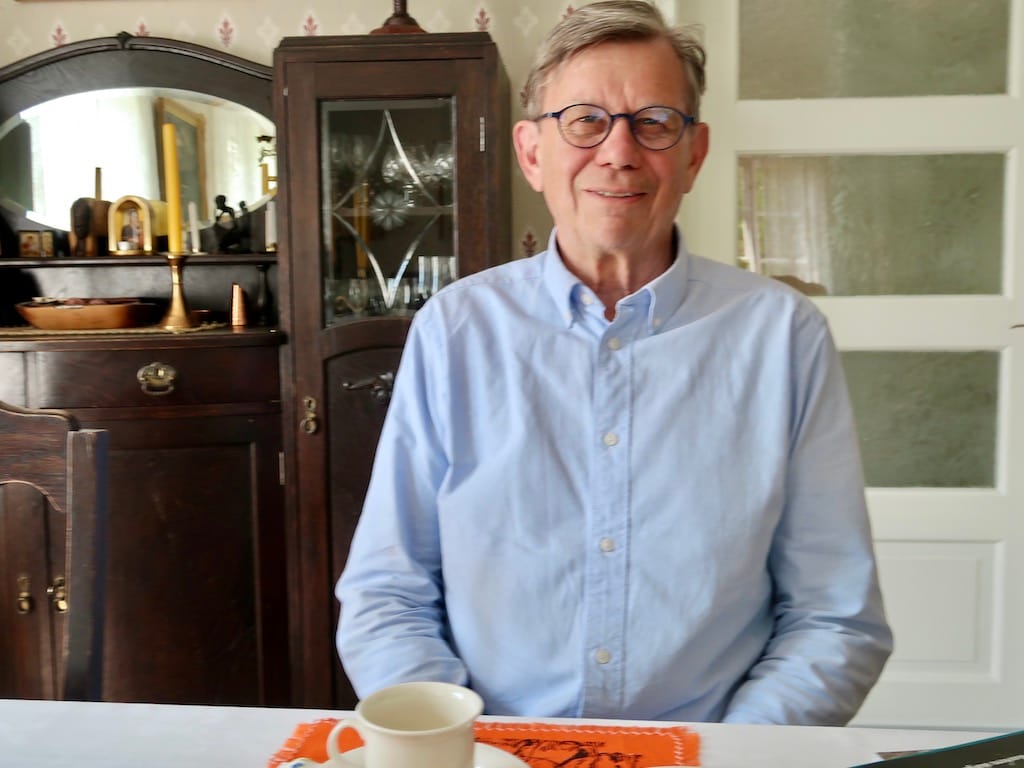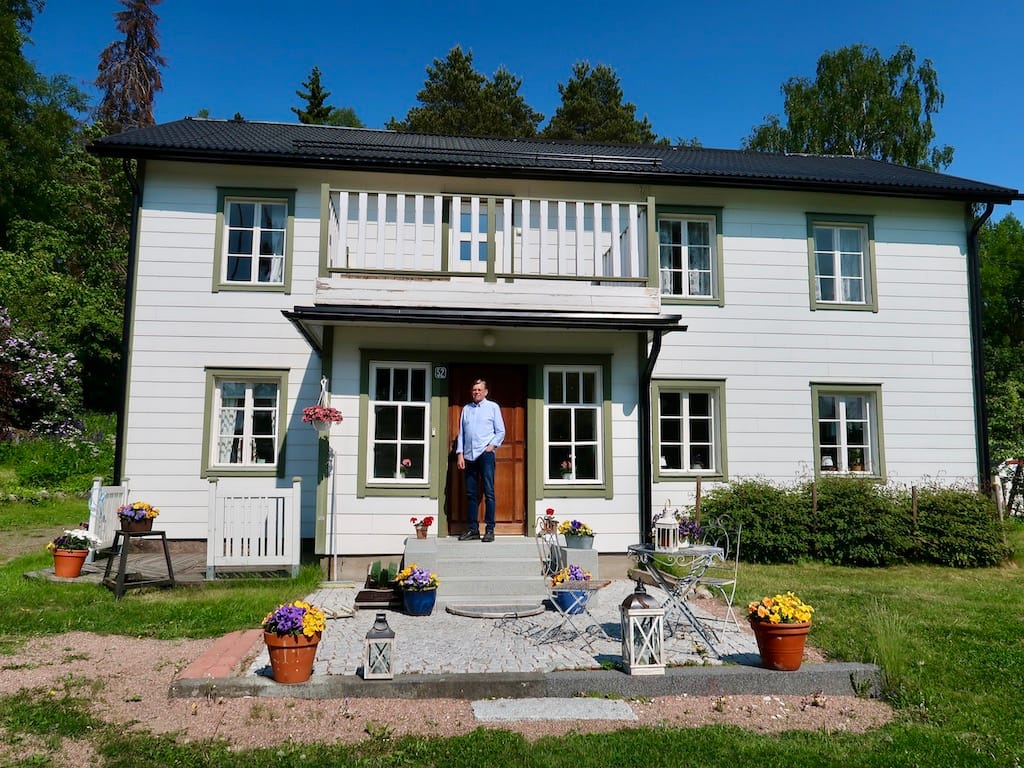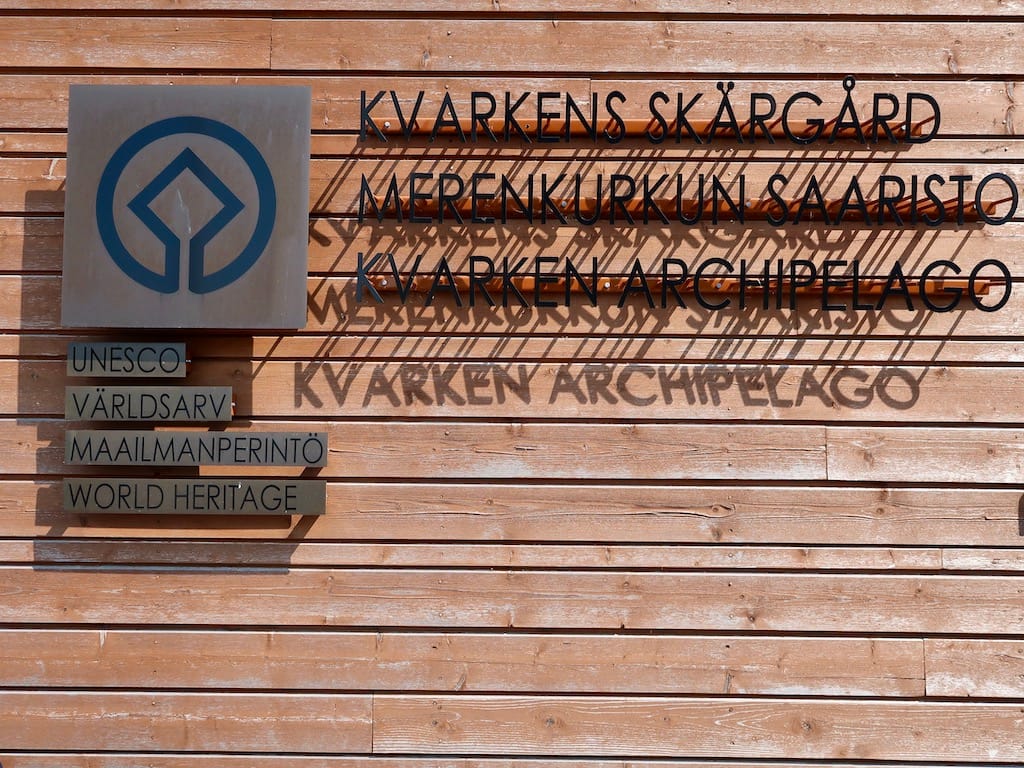Olav contributed to Kvarken becoming UNESCO World Heritage.
It is Important to Live Here and Now
We got in touch with Olav Jern through his brother Martin in Denmark. Olav lives on his well-kept family farm in Vasa. Here he enjoys life as a pensioner in an apartment on the first floor surrounded by heirlooms. His daughter and son-in-law, who are about to take over, live on the ground floor. The farm has been owned by the family since 1606, and Olav's daughter Anna and her husband are the 15th generation.
Olav has followed the family tradition of combining agriculture with outward commitment. An education as a surveying engineer led to student and national political work in Helsinki. Then to a position as County Chief Executive with overall administrative responsibility for regional development and spatial planning in Österbotten for 23 years. Our conversation took place in Swedish and Danish.

I grew up here on the farm with my older sister and two younger brothers. My parents were full-time farmers and ran the place with farming, forestry and first dairy cattle, then beef cattle. I took over in 1990 and had the farm alongside my job as a civil servant. The cattle farming came to an end in the 1990s, and the land was leased away for a period. Now we again farm 16 hectares of arable land and 30 hectares of forest as so-called "moonshine farmers" - I have spent a lot of time on the tractor this spring. The EU believes that Finland is exploiting its forests, but this is not true, the Finns maintain the forest by planting new trees.
We lived here with my grandparents, my grandfather was a Member of Parliament for the Swedish People's Party (SFP) for 32 years from 1922. My father was involved in the cooperative movement, he took over responsibility for the farm at the age of 21, when his older brother, who should have taken. over, died in the war 1944. My siblings and I had a good childhood, we participated early in work and in discussions about politics. So, it was natural that we later became active in society in different ways.
A politicized time
I finished high school in Vasa in 1969 and then studied land surveying at Aalto University in Helsinki. During my studies, I became involved in student politics and in SFP's youth association, became chairman of both the student council and Swedish Youth. It was unusual for a representative of the university's Swedish-speaking minority to become chairman of the council. It was a politicized time and we wanted to revolutionize everything. The work gave me many good contacts, which I still have.
In 1979 I was politically appointed secretary to the then Minister of Justice Christoffer Taxell. It was an exciting period, President Urho Kekkonen fell ill, and there were doubts whether he himself was able to resign from the post. He was replaced by Maunu Koivisto. At that time, the president was elected indirectly by 300 electors, since then direct presidential elections have been introduced.
I met my wife Paula in the student political environment in Helsinki. She came from a Finnish farm 80 kilometers from Vasa. We got married in 1980, and when my parents started to feel lonely, we moved into the lower apartment of the farm in 1983. Paula and I divorced in 2006, after our children grew up.
My eldest daughter Anna is now taking over the farm with her husband. My youngest daughter Heidi and her family live in Stockholm, where she works for Google. I have four grandchildren, all of whom are girls, so I actually don't know how to raise boys.
Landscape director in Ostrobothnia
In Vasa, I was employed as an ombudsman in the voluntary municipal cooperation organization Svenska Österbottens Landskabsforbund. In 1986 I was headhunted for a position at the county administrative board, which was to be part of an experiment with political representation. When a reform in 1994 moved regional development out of the county administration, I applied for and got the position of County Chief Executive in Ostrobothnia with responsibility for regional spatial planning corresponding to the tasks of the former Danish counties.
It also involved safeguarding national and cross-border political interests. I contributed i.a. to develop the border committee Kvarken Council from an experimental collaboration between Finland and Sweden into an organization with formal legal EU status. I was also head of Western Finland's European office in Brussels. Finland became a member of the EU in 1995.
Another exciting task was the inclusion of the Kvarken Archipelago uplift in UNESCO's World Natural Heritage list 2006. The High Coast in Västernorrland län on the Swedish side had been included in 2000. The land began to rise and move the coastline further out as the ice receded, and that process still continues at about eight millimeters per year.
Life as a pensioner
After 23 years in the position, I retired at the age of 67 in 2017, but still had some tasks from my job. I also took part in writing the history of the Vasa Theatre on the occasion of its centenary, because I had previously been chairman of the board.
When I had a major heart operation a year and a half ago, I realized that the best time has probably passed and that life can end at any time. So, I have abandoned most tasks to enjoy life here and now with family, friends and cultural offerings. My siblings have become more important to me after our children became adults. Half a year ago I found a new love and experienced how good it is to have a friend by one's side.
An asset to be bilingual
I am Finnish-Swedish, have attended a Swedish school and high school. In my family, we speak both Swedish and Finnish. During my time as a student and in my working life, I have also used both languages and am fluent in them. In Ostrobothnia, you can get by in Swedish, in Helsinki it is often difficult when you go to shops or stay in a hotel.
Finland has two national languages and public institutions must be able to serve citizens in both. Being bilingual is an asset, neuroscientists believe it prevents dementia. It also accustoms people to living with increased cultural diversity in a world characterized by migration.
In Ostrobothnia, many people watch Swedish TV. Some young people choose to study in Sweden and get a career there that makes them stay. I don't think my daughter Heidi in Stockholm will come to Finland again. However, she has a friend who, during the corona pandemic, took advantage of the remote work opportunity to return to her mother’s parents’ farm.
We must fight for hope
I don't worry about tomorrow, but know that health is essential. I am an active churchgoer and Christianity means a lot to me. It is important to live in the here and now, but I understand that young people are influenced by the intensive global communication and by fear of a climate disaster.
There is a tendency to focus on the negative, but many positive things also happen. People are living longer, the methods of treating disease are improving, we can fight poverty, actually many good things take place in Africa, Europe has avoided major armed conflicts for decades, and the states of the world are talking together.
It worries me, however, that our liberal conception of democracy is threatened by totalitarian ideologies in China and Russia, as well as by Donald Trump in the United States. It is important that the UN and other international organizations stand firm on what we have agreed on. It was good that Finland became a member of NATO in 2023 and was thus united with Norway, Denmark and hopefully also Sweden.
Europe was in ruins in 1945 but was rebuilt, we must fight for hope.

June 2023.
